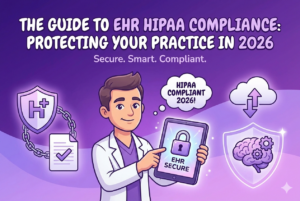The Role of BPO in Enhancing Patient Engagement Software
25 Apr 2024 By: Maria Rush
Updated
In the evolving healthcare technology field, patient engagement software is essential. It improves interactions between patients and providers. Business Process Outsourcing (BPO) also plays an important role. It streamlines tasks like scheduling and billing. This helps healthcare organizations focus more on care and operational efficiency. It’s crucial for providers to understand the connection between BPO and patient software. This knowledge aims to enhance service and patient satisfaction.

Understanding BPO and Its Importance in Healthcare
When discussing BPO in healthcare, we mean outsourcing non-core tasks to specialized providers. These tasks include scheduling, medical transcription, billing, and customer support. By using BPO providers’ expertise and resources, healthcare organizations can streamline operations and focus on quality care.
Outsourcing tasks to BPO providers also saves costs for healthcare organizations. Entrusting tasks like transcription and billing to specialists allows healthcare facilities to benefit from economies of scale and operational efficiencies. This cost-effectiveness helps providers allocate funds more strategically, investing in areas that improve patient care and outcomes.
Defining BPO in the Healthcare Context
In healthcare, BPO means working with external providers to manage administrative, financial, and operational tasks. This lets healthcare providers focus on patient care, while BPO providers handle the backend processes that support patient software, including healthcare call center solutions which ensure efficient patient communication.
Also, BPO providers in healthcare follow strict regulatory standards and compliance. They ensure patient data is secure and meets privacy laws like HIPAA. By outsourcing to knowledgeable BPO providers, organizations reduce the risk of non-compliance and data breaches. This protects patient information and maintains trust.
The Significance of BPO in Modern Healthcare
Today, patient engagement software is vital in healthcare. It lets patients access their health info, talk with providers, and participate in their care. Integrating BPO services with this software helps ensure smooth operations, efficient data management, and better patient experiences.
Additionally, the partnership between healthcare organizations and BPO providers can spur innovation in patient care. BPO companies often introduce new technologies and best practices from other fields, keeping healthcare providers at the cutting edge of digital transformation. This collaboration can create tailored solutions that boost patient outcomes, operational efficiency, and overall healthcare delivery.
What is a Patient Engagement Software?
Patient engagement software is a type of technology that enables healthcare staff and providers to connect with patients anywhere, anytime. Traditionally, healthcare organizations used phone calls and paper mail to engage with patients outside of visits.
Leading HIPAA Compliant Patient Engagement Software 2024
- NextGen Office – NextGen allows patients to handle various tasks online from home. They can fill out registration forms, submit insurance cards, update their health history, and make payments. Patients can also receive appointment reminders and manage their payment history online.
- Tebra – Tebra Engage (formerly Kareo Engage) caters to medical organizations, particularly independent practices. It features a comprehensive dashboard, calendar, patient portal, telehealth capabilities, and more. Medical practices use it to boost productivity and enhance patient care.
- athenaOne – athenaOne is a cloud-based medical software suite by AthenaHealth, an American healthcare company. It integrates electronic health records (EHR), medical billing tools, revenue cycle management (RCM), and medical practice management.
- NexHealth – NexHealth is a patient engagement platform that provides online appointment scheduling, appointment reminders, telemedicine capabilities, and secure messaging.
- Mend – Mend is a patient engagement platform designed to simplify your connection with healthcare providers. It offers tools like video visits, online paperwork, appointment reminders, and secure messaging. Mend focuses on the technology, allowing providers to concentrate on your care.
- Weave – Weave is an all-in-one experience platform tailored for small to medium-sized healthcare businesses. It connects the entire customer journey, from the first phone call to the final invoice and all interactions in between.
- RXNT – RXNT is a cloud-based software system designed for healthcare establishments, integrating clinical and practice management. It helps users manage patient records, treatments, scheduling, billing, and overall care.
- Pabau – Pabau is a comprehensive system that integrates various features such as patient bookings, marketing, payments, and stock control, all aimed at enhancing patient experience and business success. It also offers excellent customer support—quick, efficient, and includes training.
- IntakeQ – IntakeQ is a web-based software for managing online intake forms, designed for healthcare professionals and clinicians. It allows them to electronically send case forms to patients and receive them back completed and signed before the next appointment.
- PrognoCIS – PrognoCIS is a cloud-based, HIPAA-compliant medical office software that supports healthcare providers in delivering value-based care and achieving better patient outcomes.
Trending Now
Digitalization in healthcare, especially via patient engagement software (PES), has transformed interactions between providers and patients. Initially slow to embrace digital technologies, the healthcare industry has significantly shifted. The market for patient engagement software expanded from $22.7 billion in 2023 to an anticipated $70.3 billion by 2030. This software enables real-time communication between doctors and patients, fostering timely interventions and improved treatment adherence. The adoption of PES mirrors the increasing patient demand for technology in healthcare communications, marking a major shift from traditional to digital patient engagement strategies.
The Intersection of BPO and Patient Engagement Software
When BPO and patient engagement software come together, they create a powerful duo. BPO services enhance the functions and benefits of patient engagement tools.
Exploring this shows a place where efficiency and patient care meet. The interaction between BPO processes and patient engagement software is like a well-orchestrated symphony. Each part plays a vital role in balancing the healthcare ecosystem.
How BPO Complements Patient Engagement Software
BPO providers are skilled at managing complex tasks like data entry, appointment reminders, and patient feedback collection for patient engagement software. By outsourcing these tasks, healthcare organizations help ensure the software works at its best, offering a smooth and easy user experience.
Additionally, the collaboration between BPO and patient engagement software goes beyond just operational efficiency. It also enhances data security measures, making sure that sensitive patient information is treated with great care and meets regulatory standards, a priority for healthcare call center solutions.
The Synergy Between BPO and Patient Engagement Tools
BPO and patient engagement software, supported by healthcare call center solutions, form a strong team that benefits healthcare providers and patients alike. With BPO managing backend tasks, providers can focus more on meaningful interactions and personalized care. Patients enjoy easier access to their health information, faster query responses, and better overall engagement.
This partnership not only streamlines healthcare workflows but also promotes a patient-centered care culture. It connects administrative tasks with patient satisfaction, leading to a more efficient and empathetic healthcare experience for everyone involved.
Key Services Commonly Outsourced to Enhance Patient Engagement Software
Business Process Outsourcing (BPO) has become a vital part of healthcare, especially in boosting the capabilities and efficiency of Patient Engagement Software (PES). By outsourcing services like IT support, appointment scheduling, and handling Protected Health Information (PHI), healthcare providers can concentrate more on patient care. They benefit from the expertise and technological advances of BPO providers.
Outsourcing IT Services
A key role of BPO in patient engagement software is the outsourcing of IT services. This involves handing over the Software Development Company, maintenance, and upgrades to external experts. This strategy not only improves the technical capabilities of patient engagement platforms but also keeps them updated with the latest security patches and features. By working with specialized IT service providers, healthcare organizations can access advanced technologies like artificial intelligence and machine learning. These technologies help personalize patient communications and enhance engagement strategies.
Streamlining Appointment Scheduling
Another vital service provided by BPO is streamlined appointment scheduling. Efficient scheduling is crucial for optimizing clinic operations and enhancing patient satisfaction. BPO companies often use advanced software tools that integrate smoothly with patient engagement platforms. This allows patients to easily book, reschedule, or cancel appointments. Such systems not only lighten the workload for healthcare staff but also boost accessibility and convenience for patients, leading to increased engagement levels.
Handling Protected Health Information (PHI)
Managing Protected Health Information (PHI) is a crucial and sensitive part of patient engagement. BPO companies specializing in healthcare adhere to strict regulations like the U.S. Health Insurance Portability and Accountability Act (HIPAA), which governs PHI security and privacy. Outsourcing PHI management to skilled BPO providers helps healthcare organizations reduce risks of data breaches and non-compliance penalties. These providers implement strong security measures and compliance protocols, safeguarding patient data and ensuring smooth communication between patients and healthcare providers.
Booking Doctor’s Appointments
Finally, BPO plays a critical role in booking doctor’s appointments, a service especially beneficial for large healthcare facilities facing challenges in managing many appointment requests. BPO companies provide a scalable solution, handling bookings across various channels like phone calls, online portals, and mobile apps. This smooth and efficient process significantly enhances patient engagement by making healthcare services more accessible and reducing waiting times.
Challenges and Solutions in Implementing BPO for Patient Engagement Software
Implementing Business Process Outsourcing (BPO) for patient engagement software is complex and requires careful planning. While outsourcing has significant benefits, it also presents challenges that need strategic solutions for success.
A major challenge is data security. Healthcare organizations must protect sensitive patient information during the outsourcing process. This involves strong data protection measures like encryption and access controls to prevent security breaches.
Another hurdle is ensuring regulatory compliance. Healthcare providers face strict rules on patient data handling. Non-compliance can lead to heavy penalties. Organizations must ensure their BPO providers comply with all regulations and adhere strictly to data privacy laws.
Common Obstacles in BPO Implementation
Implementing BPO for patient engagement software poses several challenges, including data security concerns, ensuring regulatory compliance, and managing the transition process. These require careful planning and collaboration between healthcare organizations and their BPO provider.
Managing the transition is a significant challenge, especially when integrating compliant healthcare call center software into existing systems. Moving key processes to an external provider can disrupt current workflows and necessitates extensive staff training. Organizations need a thorough transition plan to minimize disruption and ensure smooth integration of outsourced services.
Effective Strategies for Overcoming BPO Challenges
Addressing BPO challenges requires robust data protection measures, careful selection of BPO providers through due diligence, and clear communication channels. Collaborative partnerships with BPO providers ensure effective problem-solving and a smooth transition to optimized patient engagement software.
Effective communication is key to overcoming BPO challenges and ensuring the success of outsourcing. Organizations need to maintain open communication with their BPO providers to resolve issues and adjust the outsourcing strategy as needed. By promoting transparency and collaboration, healthcare organizations can navigate BPO implementation challenges and fully leverage patient engagement software.
The Future of BPO in Patient Engagement Software
Looking ahead, Business Process Outsourcing (BPO) in patient engagement software is poised to evolve further as technology advances and patient expectations change. BPO companies are increasingly seen as strategic partners, providing specialized services to boost patient engagement and improve operational efficiency.
A key area where BPO is making a significant impact is in data security and compliance. As healthcare organizations handle more sensitive patient data, BPO providers are stepping up with strong security measures and ensuring compliance with regulations like HIPAA. This not only protects patient information but also enhances trust and credibility among patients.
Emerging Trends in BPO and Patient Engagement
One key trend is integrating artificial intelligence (AI) and machine learning (ML) into BPO services. This enables the intelligent automation of routine tasks, boosting the efficiency of patient engagement software. Virtual assistants and chatbots, which offer 24/7 patient interaction and support, are also becoming more common. These AI-driven solutions are transforming how patients access information, schedule appointments, and receive personalized care.
Another trend is the globalization of BPO services in healthcare. BPO providers are setting up in various countries to access a diverse talent pool and offer cost-effective solutions. This global reach enables them to provide continuous support across different time zones, ensuring uninterrupted communication and service delivery.
Predictions for BPO’s Role in Future Patient Engagement Software
As patient engagement software continues to advance, BPO services will play a pivotal role in further optimizing its performance. From advanced analytics capabilities to personalized patient experiences, BPO will continue to help healthcare organizations harness the full potential of patient engagement software to improve outcomes and empower patients in their healthcare journey. The future of BPO in patient engagement software lies in its ability to adapt to evolving technologies and patient needs, providing innovative solutions that drive patient satisfaction and loyalty.
Conclusion
The collaboration between healthcare providers and BPO companies significantly enhances the effectiveness of Patient Engagement Software. From IT support to appointment scheduling, the expertise of BPO can help healthcare organizations achieve a higher standard of patient care and engagement. By ensuring the reliable handling of PHI and easing the process of booking appointments, BPO services enable healthcare providers to maintain a focus on what truly matters—patient care and satisfaction. As the demand for patient-centered care grows, so too will the importance of integrating specialized BPO services into healthcare operations.
Ready to elevate your patient engagement software with the support of a dedicated BPO team? Look no further than HelpSquad. Our skilled virtual assistants and 24/7 customer service team are equipped to handle your customer support, back-office tasks, and research needs efficiently. With bilingual agents available from just $8.50 per hour, HelpSquad BPO is your partner in streamlining operations and enhancing patient experiences. Start your trial today and take the first step towards optimized patient engagement with HelpSquad BPO.


